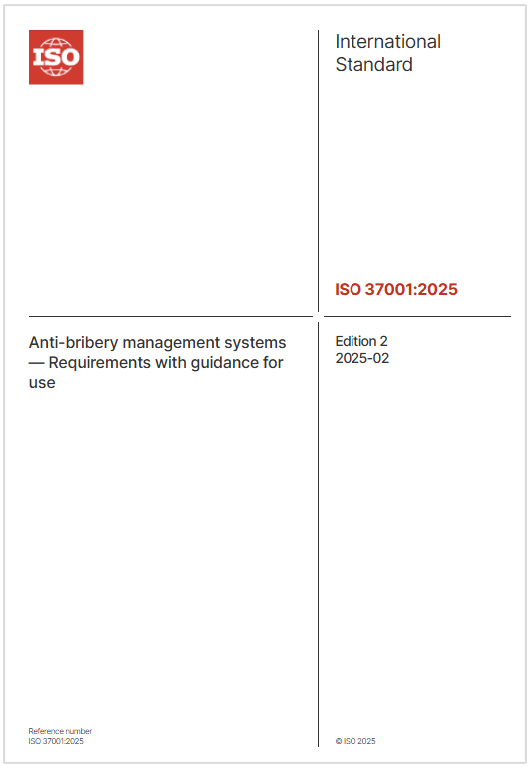UNI ISO 37001:2025 / Sistemi di gestione per la prevenzione della corruzione (Ed. 2 Sett. 2025
| Appunti Normazione | ||
| Newsletter n. 534 del 06 Ottobre 2025 | ||
| Salve Visitatore | ||
UNI ISO 37001:2025 ID 23732 | Update 03.10.2025 / Preview allegata Adozione UNI In data 11 settembre 2025 è adottata da UNI come: UNI ISO 37001:2025 Pubblicata da ISO il 28 Febbraio 2025 la seconda edizione dell norma ISO 37001 sui Requisiti dei Sistemi di gestione per la prevenzione della corruzione che sostituisce la precedente versione del 2016 (ISO 37001:2016). ISO 37001:2025 Sistemi di gestione per la prevenzione della corruzione - Requisiti e guida all'utilizzo La UNI ISO 37001 specifica requisiti e fornisce una guida per stabilire, mettere in atto, mantenere, aggiornare e migliorare un sistema di gestione per la prevenzione della corruzione. Il sistema può essere a sè stante o integrato in un sistema di gestione complessivo. Le principali modifiche sono le seguenti: ISO 37001:2025 Publication date: 28 febbraio 2025 Introduction Governments have made progress in addressing bribery through international agreements such as the Organization for Economic Co-operation and Development Convention on Combating Bribery of Foreign Public Officials in International Business Transactions[19] and the United Nations Convention against Corruption[18] and through their national laws. In most jurisdictions, it is an offence for individuals to engage in bribery and there is a growing trend to make organizations, as well as individuals, liable for bribery. A well-managed organization is expected to have a compliance policy supported by appropriate management systems to assist it in complying with its legal obligations and commitment to integrity. An anti-bribery policy is a component of an overall compliance policy. The anti-bribery policy and supporting management system help an organization to avoid or mitigate the costs, risks and damage of involvement in bribery, to promote trust and confidence in business dealings and to enhance its reputation. This document reflects international good practice and can be used in all jurisdictions. It is applicable to small, medium and large organizations in all sectors, including public, private and not-for-profit sectors. The bribery risks facing an organization vary according to factors such as the size of the organization, the locations and sectors in which the organization operates, and the nature, scale and complexity of the organization's activities. This document specifies the implementation by the organization of policies, procedures and controls which are reasonable and proportionate according to the bribery risks the organization faces. Annex A provides guidance on implementing the requirements of this document. Conformity with this document cannot provide assurance that no bribery has occurred or will occur in relation to the organization, as it is not possible to completely eliminate the risk of bribery. However, this document can help the organization implement reasonable and proportionate measures designed to prevent, detect and respond to bribery. This document can be used in conjunction with other management system standards (e.g. ISO 9001, ISO 14001, ISO/IEC 27001, ISO 37301 and ISO 37002) and management standards (e.g. ISO 26000 and ISO 31000). 1 Scope The system can be stand-alone or can be integrated into an overall management system. This document addresses the following in relation to the organization's activities: - bribery in the public, private and not-for-profit sectors; This document is applicable only to bribery. It sets out requirements and provides guidance for a management system designed to help an organization to prevent, detect and respond to bribery and comply with anti-bribery laws and voluntary commitments applicable to its activities. The requirements of this document are generic and are intended to be applicable to all organizations (or parts of an organization), regardless of type, size and nature of activity, and whether in the public, private or not-for-profit sectors. The extent of application of these requirements depends on the factors specified in 4.1, 4.2 and 4.5. NOTE 1 See Clause A.2 for guidance.
Collegati |
||
 |
||
|
sono siti di: Se vuoi cancellarti dall'invio della newsletter clicca qui oppure effettua il login al sito ed entra nella Tua Area Riservata, in “Modifica dati” agisci con la spunta sul box di selezione “newsletter”. L'elenco completo di tutte le ns newsletter è qui: Archivio newsletter certifico.com
Testata editoriale iscritta al n. 22/2024 registro periodici Tribunale di Perugia 19.11.2024 |
||
| Certifico Srl 2000-2025 | VAT IT02442650541 | ||
